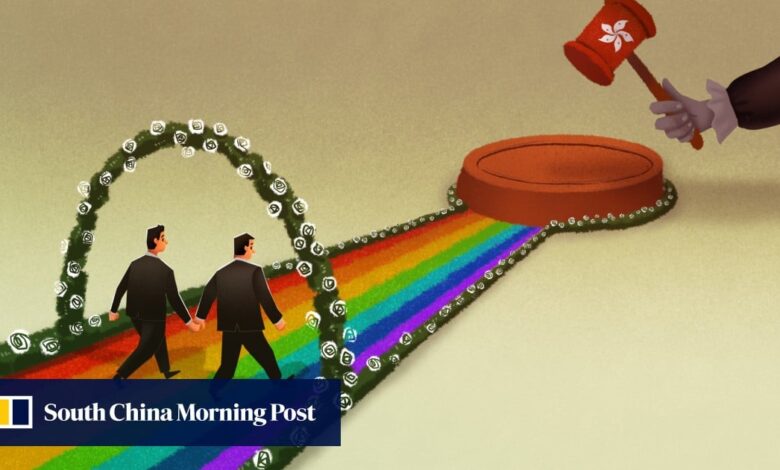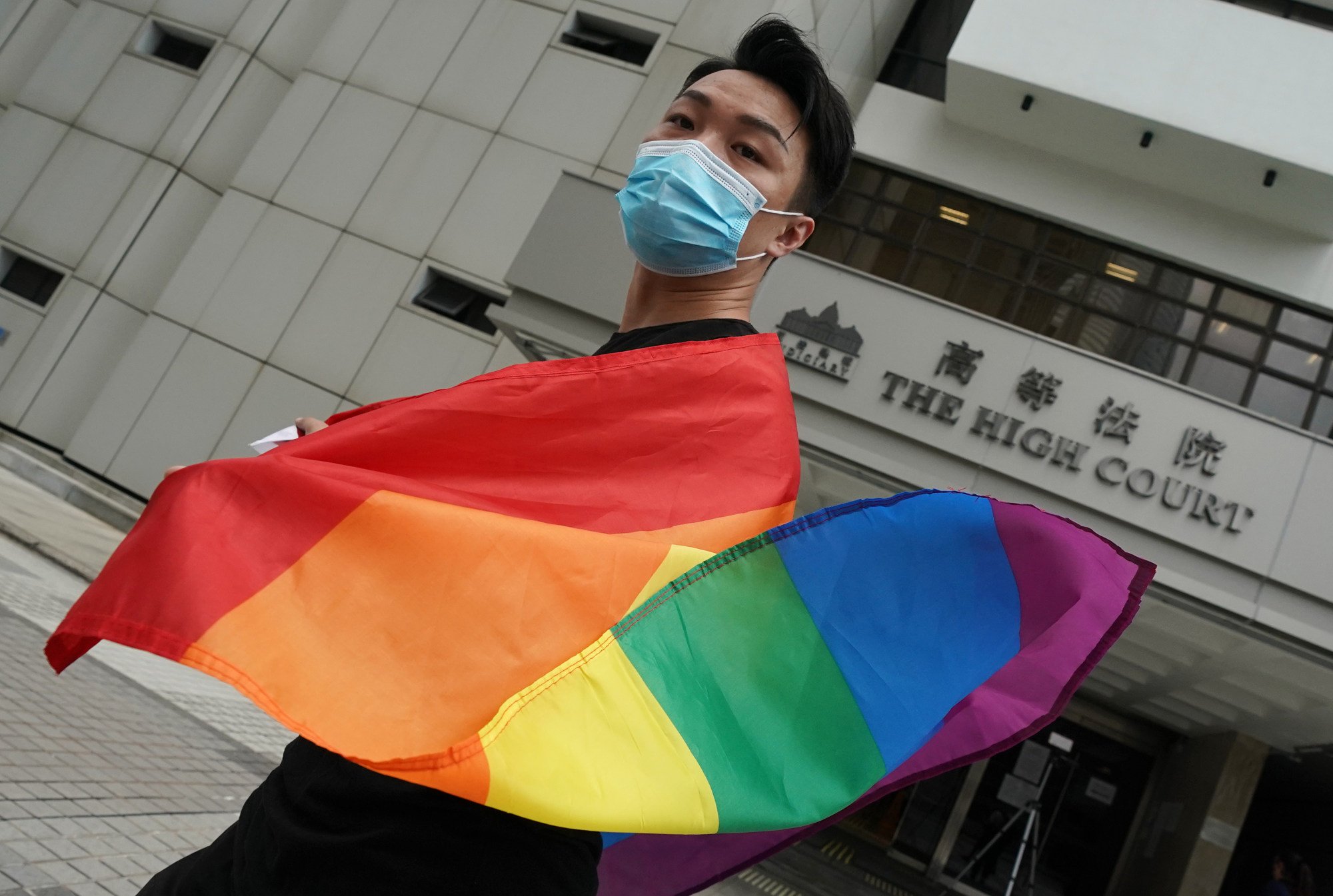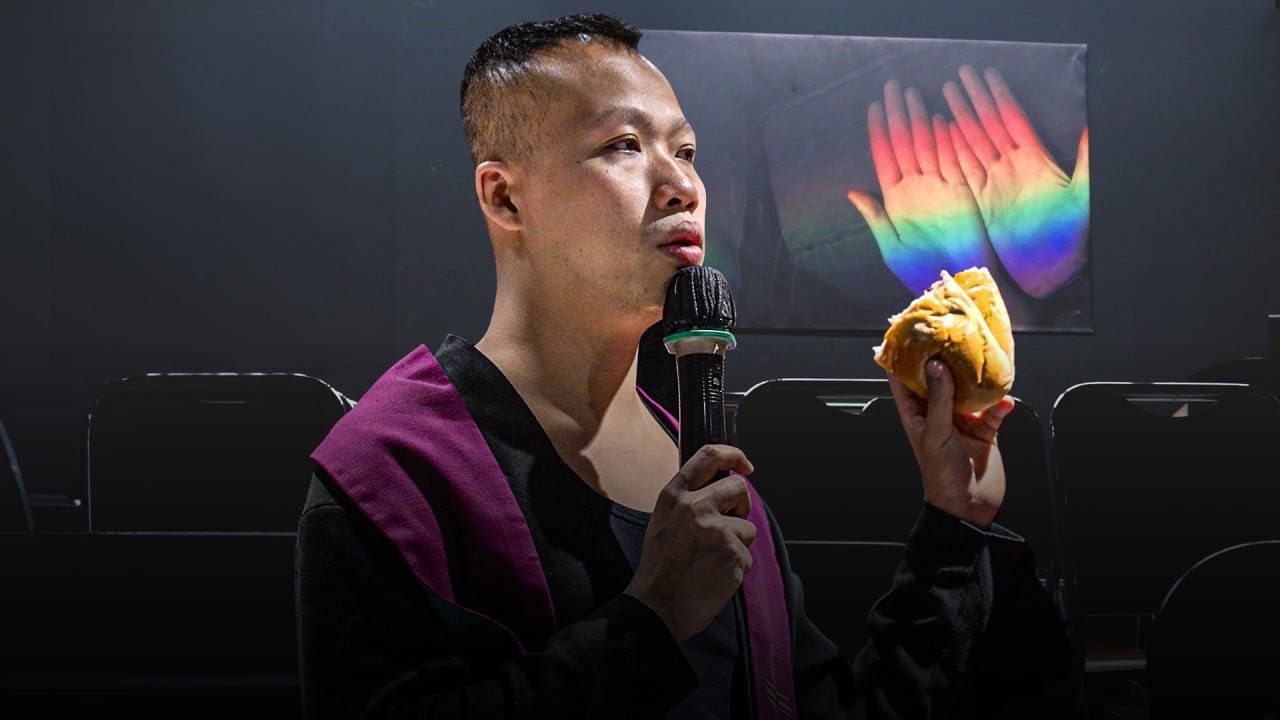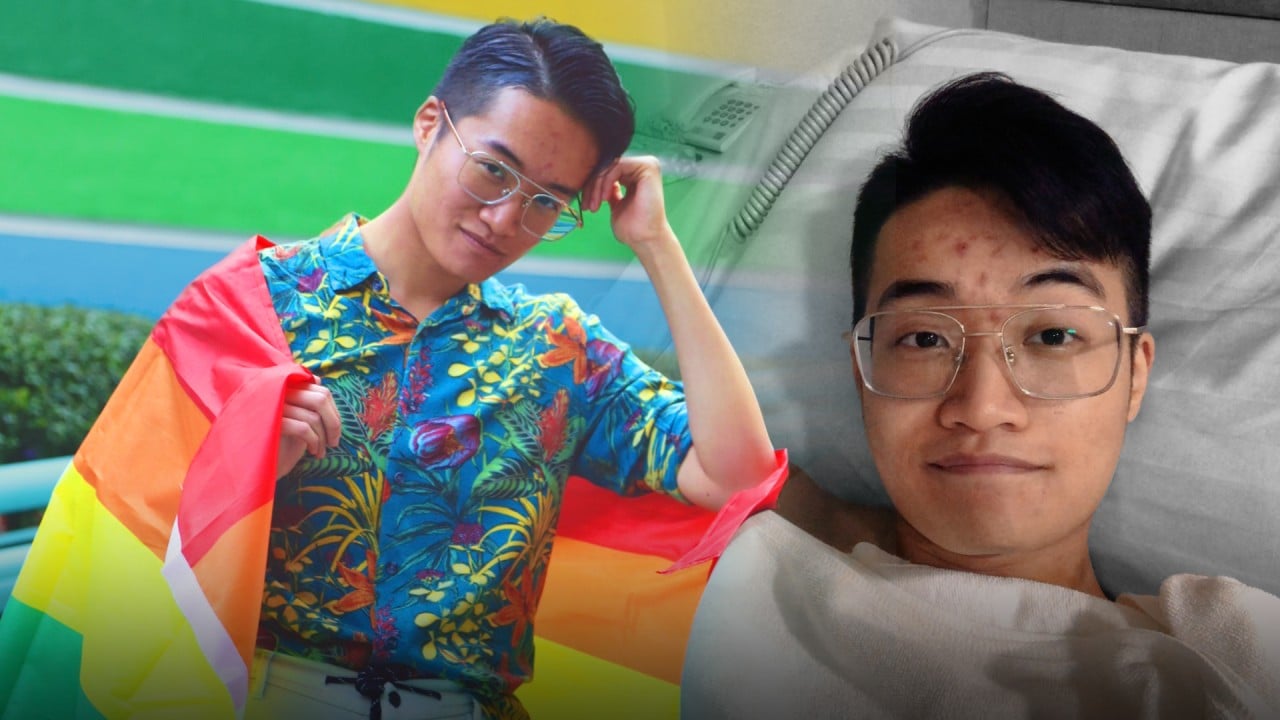Uncertainties abound after landmark Hong Kong court ruling on same-sex partnerships. What exactly will change for couples, and when?

[ad_1]
“I’m not optimistic that progress will happen that fast,” McGinnis, 35, said. “If there is no comprehensive protection, we can’t stay in Hong Kong.”
LGBTQ rights in Hong Kong: legal milestones in the long battle for equality
LGBTQ rights in Hong Kong: legal milestones in the long battle for equality
On September 5, Hong Kong’s top court ruled that the government had violated the city’s Bill of Rights by failing to provide some form of legal recognition, such as civil partnerships, for same-sex couples.
It gave the government two years to draw up laws setting out “core rights” of same-sex couples, but did not outline what they might be.
The ruling followed a judicial challenge by detained activist Jimmy Sham Tsz-kit who questioned whether Hong Kong’s laws relating to same-sex couples and marriage were unconstitutional.
The five-judge court ruled outright against recognising same-sex marriage, but its decision on a framework of rights was seen as a victory for the city’s LGBTQ community, raising hopes that an era of piecemeal, drawn-out legal challenges could be nearing an end.

The parties in the case – Sham and the government – have until September 26 to suggest what each wished to include as “core rights” within a final civil partnership framework.
The court will then determine a minimum threshold of what should be in the final framework, or what will happen if the government fails to implement legislation within the two-year deadline.
Lawyers and activists who spoke to the Post warned that any framework that was not comprehensive enough only risked setting up more legal challenges in the future.
“You’ve got the highest court in the land saying the government needs to give you these rights, so now the next battle is how that’s going to work,” said Mark Daly, a Hong Kong-based human rights lawyer whose firm has handled numerous LGBTQ cases.
‘I tried my very best’: host of Hong Kong’s axed LGBTQ radio show reflects
‘I tried my very best’: host of Hong Kong’s axed LGBTQ radio show reflects
Strict legal definition of marriage
Civil partnerships, or civil unions, are a kind of parallel institution to marriage that have been adopted in many jurisdictions where same-sex couples are not allowed to, or previously could not, marry.
But not all jurisdictions with civil partnerships grant parallel rights with those of marriage.
In the Czech Republic, same-sex couples are entitled to such things as inheritance and hospital visitation, but not joint adoption, widow’s pensions, or joint property rights.
And in Catholic-majority Italy, which established civil partnerships in 2016, same-sex couples do not have the right to adoption or surrogacy.
Hong Kong must create legal framework for same-sex partnerships: top court
Hong Kong must create legal framework for same-sex partnerships: top court
In Hong Kong, gay sex was decriminalised in 1991, but same-sex couples have never had legal recognition, owing to a strict legal definition of marriage as being between a man and a woman.
However, numerous judicial challenges over the past decade have resulted in some protections.
In 2018, the top court ruled that civil union partnerships for same-sex couples would be recognised in Hong Kong for the specific purpose of a dependant visa.
A year later it ruled that gay and lesbian civil servants were eligible for spousal benefits, including dental and medical benefits.
A series of lower court rulings between 2020 and 2021 provided interim rights regarding inheritance, cohabitation and ownership of public housing flats, although the government is appealing those decisions.
This piecemeal approach has led to many complications. For example, there are joint custody rights for same-sex parents where one is biologically related to the child, but couples cannot jointly adopt, and surrogacy is not allowed.
The lack of legal recognition in Hong Kong has driven a growing number of same-sex couples to marry elsewhere.
Hongkonger Kurt Tung set up Next Chapter to help same-sex couples register their marriage online, a process recognised in the United States. She said she helped more than 200 couples in the past two years alone.
But there were risks to marrying overseas, said Sarina Cheung, a consultant with law firm Rita Ku & Ser.
Cheung said some countries such as Iceland and Denmark allowed non-residents to marry, but imposed strict residency rules when it came to divorce.
“It’s quite alarming that a lot of same-sex couples do not know there is a chance they might not get divorced in case of a separation,” she said.
Lawyers Jocelyn and Evelyn Tsao, twins who have handled LGBTQ-related cases, said they expected major issues such as separation rights and medical decision-making would be covered under the framework.
But they said it remained to be seen if adoption and other parental rights extended to both gay and lesbian couples would be included.
“These core rights and obligations are designed to protect things which arise because of two people forming a relationship together, so children may not be envisaged within this,” Jocelyn said.
‘Trauma, alienation’ still haunt LGBTQ Indians after end of gay sex ban: judge
‘Trauma, alienation’ still haunt LGBTQ Indians after end of gay sex ban: judge
Lawyer Azan Marwah cautioned that having any “significant differences” between the rights enjoyed under marriage and the eventual framework for same-sex couples would inspire further litigation.
“If you are going to have two different [statutes], with two different substances, it creates additional problems,” he said. “We’re going to have a whole new language around these two groups of people, and that language can lead to discrimination at a private level.”
The government would have to take a “very technocratic look” at existing legislation that would need updating, he added. For example, the strict legal view of marriage is apparent in many laws, including the definition of consummation as being heterosexual intercourse only.
Marwah noted that many jurisdictions which implemented civil partnerships, such as the UK and Ireland, eventually succumbed to political and social pressures and opened up marriage to everyone.
“The simplest, most sensible, clearest, cleanest and totally acceptable approach is just to expand the definition of marriage to include same-sex couples,” he said.
‘A special perspective’: Hong Kong LGBTQ life coaches on their own journey
‘A special perspective’: Hong Kong LGBTQ life coaches on their own journey
A long way to go for change?
It also provided a “flexible margin of discretion” for the government to decide what the final content of the rights and obligations would be.
“It seems like the court has passed the buck to the government,” said Brian Leung Siu-fai, chief operating officer of Big Love Alliance, a Hong Kong-based charity which advocates for the LGBTQ community.
“Will we have to litigate each ungranted right through more judicial review?” he said.
The Hong Kong government has not commented on the ruling since it was handed down.
A government spokesperson said: “Since the parties may lodge written submissions on relief as directed by the court, the case has not completely concluded and it is inappropriate to give any comment at this juncture.”
Some members of Hong Kong’s LGBTQ community were concerned that despite the court ruling, any change would be a long time coming.
Hongkongers Dino Wong, 30, and Geoffrey Yu, 34, who married in the US territory of Guam in 2019, said they felt “stuck in an endless loop” waiting to know if they could start a family.
“It would be great to see adoption rights included in the final framework, but I don’t have high hopes,” said Wong, a clinical psychologist.
They referred to what happened in 2013 when the apex court ruled transgender people were eligible for entering into a legal marriage. While the government did amend the ordinance in 2014 in accordance with the ruling, it was also required to set up an interdepartmental working group to develop legislation on gender recognition. The group has yet to propose a timeline for legislation.
But lawyers did not believe the government would be able to significantly delay implementing the framework.
Marwah said: “The court is likely to put into place a ‘default’ order that would be given automatic effect.”
Protecting LGBTQ rights can be ‘selling point’ for Hong Kong: UK envoy
Protecting LGBTQ rights can be ‘selling point’ for Hong Kong: UK envoy
The latest development also resurfaced the issue of whether Hong Kong was ready to give same-sex couples more rights.
Lawmaker Ambrose Lam San-keung, who represents the legal sector, said: “We don’t consider that society has reached any consensus.”
He declined to comment on how the Legco might handle the framework, only saying: “We are observing the developments.”
Choi Chi-sum, general secretary of the Society for Truth and Light, a Christian group supporting traditional family values, expressed regret over the judges’ decision.
“We object to civil partnerships enjoying benefits similar to marriage. If the government greenlights any form of same-sex union, it will be just a matter of time before we ultimately arrive at same-sex marriage legalisation,” he said.
He suggested that same-sex couples secure their rights through some other another legally binding agreement, instead of challenging the whole marriage system.
Hongkongers’ views on same-sex marriage have become more liberal over the years, according to a joint survey released this year by the University of Hong Kong, Chinese University and the University of North Carolina at Chapel Hill in the US.
The telephone survey of more than 1,500 Hong Kong residents over 18 years old found that 60 per cent supported same-sex marriage, a sharp rise from 38 per cent a decade ago.
Only 17 per cent were against same-sex marriage, while almost one in four gave a “neutral” response.
Professor Suen Yiu-tung, of the department of gender studies at Chinese University, who co-led the research, said: “Support of LGBT rights in Hong Kong society has apparently been ahead of its policy and legal development.”
Despite the outstanding questions over the framework, some in the LGBTQ community were choosing to remain optimistic.
Hong Kong permanent resident Neil Lewis, 45, has a four-year-old daughter through surrogacy in the UK, and is now going through the process of adoption in Hong Kong with his Chinese-New Zealander husband.
Hong Kong’s LGBT community struggles for acceptance in sports, CUHK survey shows
Hong Kong’s LGBT community struggles for acceptance in sports, CUHK survey shows
For now, he has to apply as a single parent, but he was upbeat about the potential for joint-adoption rights to be extended to same-sex couples under the new framework.
“I’m actually hopeful that by the time we go to the family court, that there may be a change that allows both of us to be recognised,” he said. “Ultimately, anything that improves the rights of same-sex couples is positive.”
Alan Hau, deacon and executive director of the LGBT-inclusive Blessed Ministry Community Church, said the ruling had opened a “special door” and the community should take advantage of public consultations that are expected to take place.
“The ball is in our court. LGBTQ folk need to stand up for their rights, be vocal and let the government and legislators know what we need,” he said.
[ad_2]
Source link







